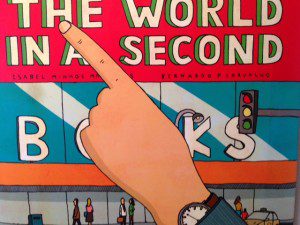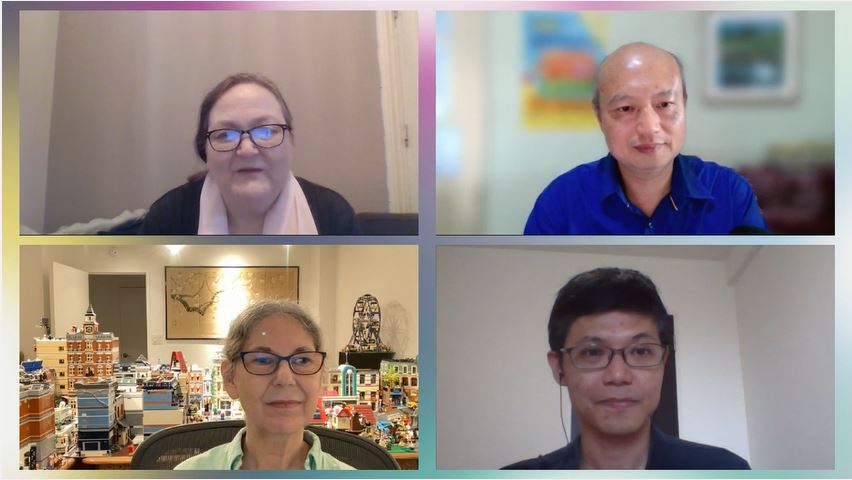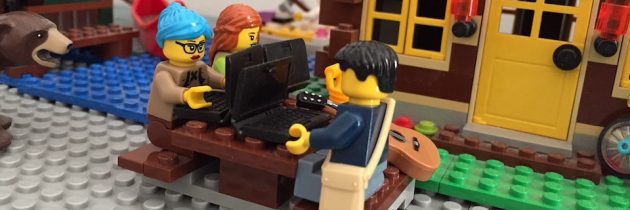A Workshop on Translation
Now that I have books recently published and in the pipeline, I’m being asked to teach writing classes and workshops. While I’m not sure the publications instantly qualify me to teach when I’ve taught young writers before and offered advice on this blog, that’s the way things work. Those who want to teach have to show qualifications, whether it’s an advanced degree like the MFA, traditional publishing contracts, or, in the case of a course on self-publishing, a proven success with a self-published book.
 In 2014, I translated my first children’s book from Portuguese to English, and that book, The World in a Second, came out from Enchanted Lion the following year. Since then, I translated five more picture books for publishers in the United States (two additional books with Enchanted Lion, and one each with Eerdman’s, Charlesbridge, and the Nancy Paulsen Books imprint of Penguin Random House) and one middle grade novel for a Brazilian publisher looking to bring out a trilingual (Portuguese, Spanish, English) in that country. I am now working on four other translations — two picture books and two graphic novels, my first time for that genre — that will come out in the next 2-3 years. I’ve seen more publishers interested in bringing out international literature in translation over the past few years, to the point that translations, once 1% of all published children’s and YA books, is now 3% and rising. And demand is increasing for workshops focused on how to break into translation and the special concerns of translating books for young readers.
In 2014, I translated my first children’s book from Portuguese to English, and that book, The World in a Second, came out from Enchanted Lion the following year. Since then, I translated five more picture books for publishers in the United States (two additional books with Enchanted Lion, and one each with Eerdman’s, Charlesbridge, and the Nancy Paulsen Books imprint of Penguin Random House) and one middle grade novel for a Brazilian publisher looking to bring out a trilingual (Portuguese, Spanish, English) in that country. I am now working on four other translations — two picture books and two graphic novels, my first time for that genre — that will come out in the next 2-3 years. I’ve seen more publishers interested in bringing out international literature in translation over the past few years, to the point that translations, once 1% of all published children’s and YA books, is now 3% and rising. And demand is increasing for workshops focused on how to break into translation and the special concerns of translating books for young readers.

AFCC panelists, clockwise from top left: Helen Wang, A Jia, Andrew Wong, and me. Screen capture by Andrew Wong.
At the end of May, I was one of three panelists and moderator Helen Wang, who spoke at the Asian Festival of Children’s Content about political and cultural concerns in translating both text and images in picture books. The conference, based in Singapore, took place mainly online, with speakers from Tokyo (Andrew Wong), Guangzhou (Ajia), London (Helen Wang) and New York (me). While the 12:30 pm Singapore time slot worked for Andrew and Ajia, I had to stay up until nearly 2 am, which to me was still better than poor Helen who had to rise and shine before 5 am. Despite being one of the speakers, Andrew, translator of the excellent picture book The World’s Poorest President Speaks Out, took notes and wrote an excellent summary of the panel.
On September 12, I will be offering a workshop for prospective translators through the Eastern Pennsylvania chapter of SCBWI. This is my second SCBWI teaching event; in the first, via the Ohio North chapter on July 27, I’ll be on a panel on writing disabled characters in children and YA books. I believe I’m the solo performer for the September 12 event, where I plan to talk about the increased demand for books in translation (and how we can keep it going by buying books in translation), the process by which a book published in another country and language makes its way to the U.S., special considerations in translating books for children and teens, how to get that first translation gig (and more after that!), and options for the contract, copyright, credit, and payment.
As far as the last topic related to the contract, the landscape for translation is rapidly changing…and improving! The Batchelder Award, given by the Association of Library Services to Children (ALSC) division of ALA, for outstanding children’s books in translation, now stipulates that the translator has to be named and credited, preferably on the cover of the book and not just on the title page and/or copyright page. In addition, the Authors Guild, which invites translators to join, now has a sample contract and FAQs to advise translators whether they’re getting a good deal before they take on a project. And the SCBWI has a separate translator category and considers translators to be PAL (traditionally published) members upon publication of their first translation. SCBWI also offers annual Work-in-Progress awards for translation samples — considered a completed picture book or the first ten pages of a longer work — and winners receive the same exposure of their work to interested editors and agents as the winners of the other Work-in-Progress grants.
Again, the great thing about online workshops is that anyone can sign up no matter where they live. If you’re thinking of translating children’s books or just curious about how translation works, I urge you to mark your calendars for September 12 at 7 pm ET and check the SCBWI-EPA website for registration details.







Lyn, I can’t think of anyone better to do this type of workshop than you.